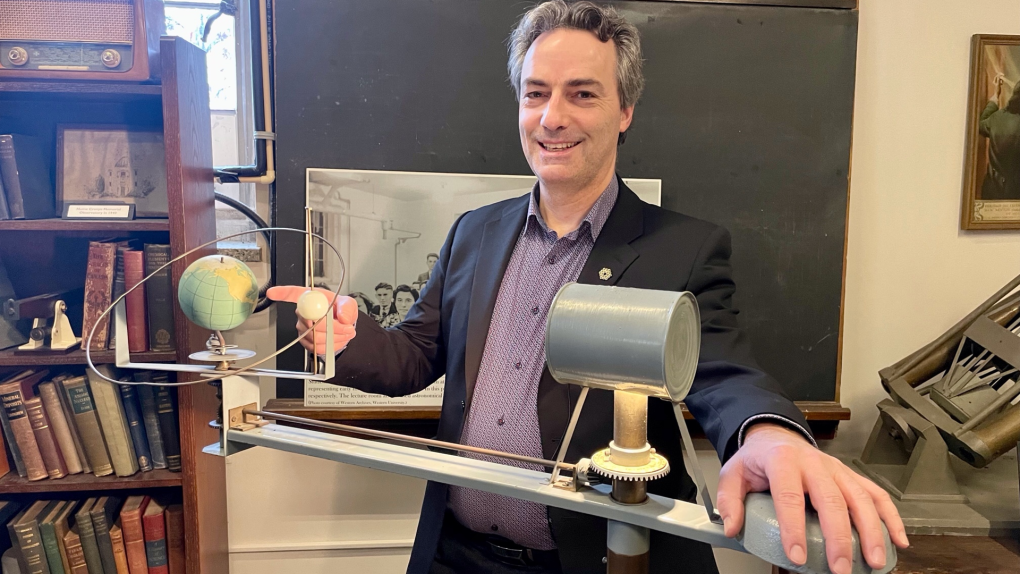Western astronomer advises Londoners to 'head south' for coming total solar eclipse
Expect a rush to all points south for the coming solar eclipse.
On Monday, April 8, the sky will go dark in some areas of southwestern Ontario.
But where you are located will make “the difference between night and day,” according to a Western University astronomer.
Inside the Hume Cronyn Observatory at Western, Professor Jan Cami utilized a vintage educational tool to demonstrate a total solar eclipse.
“As the moon orbits the earth, what happens is, at some point, the moon actually moves in front of the sun from the earth’s point of view, and so you actually see there is a shadow.”
When the moon casts its actual shadow, it will mark the first total solar eclipse in southwestern Ontario since 1925.
But the area of totality, as the celestial event passes over the continent, is just 200 kilometres wide.
Our region will sit on the fringe.
 Western Astronomer Jan Cami, seen on Feb. 1, 2024, points to a shadow created by a simulated total solar eclipse using a teaching tool dating back to the 1940s. (Sean Irvine/CTV News London)
Western Astronomer Jan Cami, seen on Feb. 1, 2024, points to a shadow created by a simulated total solar eclipse using a teaching tool dating back to the 1940s. (Sean Irvine/CTV News London)
As a result, London will not go completely dark. However, points south, including St. Thomas and Port Stanley, will see day turn to night.
Cami said it will be worth fighting possible traffic jams to view from those areas.
“The difference, I can tell you, between a 99.9 per cent partial eclipse and a total solar eclipse is literally the difference between day and night.”
Weather permitting, this eclipse is expected to generate stratospheric excitement beyond any recent events.
In August 2017, a partial eclipse drew a big crowd to a public event at Western. Attendees wore special eclipse glasses to look up safely.
Anyone in school in the late 1970s remembers being locked inside classrooms during another partial eclipse.
This time around, several school boards have moved a PA Day so kids will be at home.
Cami encourages parents to purchase glasses to share the moment with their children safely.
That’s what parent Levi Marconi is set to do with his two boys.
“We are planning on watching the eclipse with proper protection. But I’m glad they are able to do that because they are home with us.”
Although relatively affordable to purchase, eclipse glasses are being provided free of charge to anyone attending an information night at the Hume Cronyn Observatory on Saturday, March 23 from 8 p.m. to 10 p.m.
Cami plans to remind everyone who can find a way south on April 8, “I think a lot of people will travel to the path of totality because it is the most amazing experience I’ve ever seen.”
Cami has viewed three previous total solar eclipses in various parts of the world.
CTVNews.ca Top Stories

W5 Investigates A 'ticking time bomb': Inside Syria's toughest prison holding accused high-ranking ISIS members
In the last of a three-part investigation, W5's Avery Haines was given rare access to a Syrian prison, where thousands of accused high-ranking ISIS members are being held.
'Mayday!': New details emerge after Boeing plane makes emergency landing at Mirabel airport
New details suggest that there were communication issues between the pilots of a charter flight and the control tower at Montreal's Mirabel airport when a Boeing 737 made an emergency landing on Wednesday.
BREAKING Supreme Court affirms constitutionality of B.C. law on opioid health costs recovery
Canada's top court has affirmed the constitutionality of a law that would allow British Columbia to pursue a class-action lawsuit against opioid providers on behalf of other provinces, the territories and the federal government.
Cucumbers sold in Ontario, other provinces recalled over possible salmonella contamination
A U.S. company is recalling cucumbers sold in Ontario and other Canadian provinces due to possible salmonella contamination.
Irregular sleep patterns may raise risk of heart attack and stroke, study suggests
Sleeping and waking up at different times is associated with an increased risk of heart attack and stroke, even for people who get the recommended amount of sleep, according to new research.
Real GDP per capita declines for 6th consecutive quarter, household savings rise
Statistics Canada says the economy grew at an annualized pace of one per cent during the third quarter, in line with economists' expectations.
Nick Cannon says he's seeking help for narcissistic personality disorder
Nick Cannon has spoken out about his recent diagnosis of narcissistic personality disorder, saying 'I need help.'
California man who went missing for 25 years found after sister sees his picture in the news
It’s a Thanksgiving miracle for one California family after a man who went missing in 1999 was found 25 years later when his sister saw a photo of him in an online article, authorities said.
As Australia bans social media for children, Quebec is paying close attention
As Australia moves to ban social media for children under 16, Quebec is debating whether to follow suit.

































